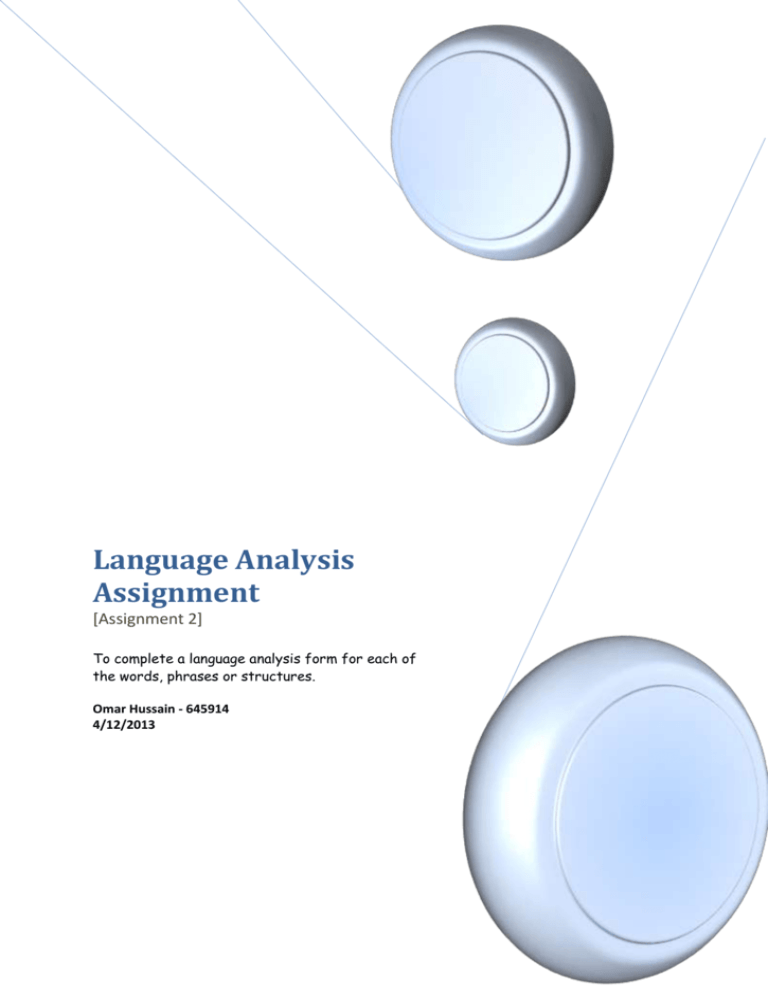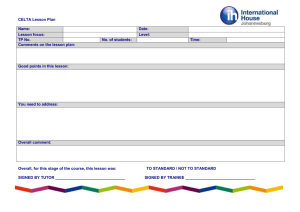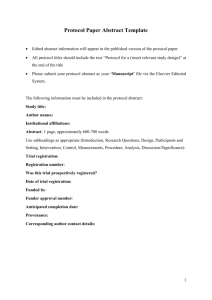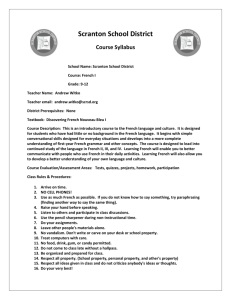Language Analysis Assignment
advertisement

Language Analysis Assignment [Assignment 2] To complete a language analysis form for each of the words, phrases or structures. Omar Hussain - 645914 4/12/2013 Language Analysis Sheet TARGET LANGUAGE A library vs a bookshop (Elementary) MEANING/USE Library – a room or building containing books that can be looked at or borrowed. Bookshop – a shop that sells books. FORM A library (pl) libraries (countable noun, irregular plural) A bookshop (pl) bookshops (countable noun) PRON / ˈlaɪbrəri / / ˈbʊkʃɒp / CONTEXT OF PRESENTATION Show ss a few books with library stamps on the inside cover and another set of books with the price on it. Elicit from the pictures how I sometimes borrow books from the library (holding the library books) and sometimes buy books from a bookshop (now holding the second set of books). CONCEPT CHECKING (questions and responses, timelines etc.) Library: Can I keep the books? (No) Do I have to return the books? (Yes) Do I have to pay for the books? (No) Can I read the books there? (Yes) Bookshop: Can I keep the books? (Yes) Do I have to return the books? (No) Do I have to pay for the books? (Yes) ANTICIPATED PROBLEMS Form Ss may forget that library is an irregular noun. ANTICIPATED PROBLEMS Meaning/use Ss may confuse the two words. Also they could confuse the two if the word in their L1 is similar to the form of one of the English words but has a different meaning, (aka; false friends). So in French “librairie” means bookshop. ANTICIPATED PROBLEMS Pronunciation Ss may pronounce / ˈbʊkʃɒp / as / ˈbuːkʃɒp /. I.e, prolonging the combination of the two vowels “oo”. Ss may muddle up the word / ˈlaɪbrəri / and / ˈlaɪbri / maybe due to the difficulty of repeating the /r/ in the same syllable or successive syllable. Hence the close proximity of the two /r/’s may cause a problem. TARGET LANGUAGE: He looked up the word in a dictionary. (Intermediate) MEANING/USE To try and find(1) a piece of information that you do not understand (or know the meaning of)(2) by looking in a book (or a computer). FORM To look up smth To look smth up (when object is a noun) Subject + phrasal verb. Separable. But inseparable when the object is a pronoun. (Phrasal verb) To look up something () To look something up () To look it up () To look up it (X) PRON / hi lʊkt ʌp ðə ˈwɜːd ɪn ə ˈdɪkʃənri / CONTEXT OF PRESENTATION Ask the student if someone didn’t know the meaning of a word what they would do. Elicit, “he would look up the word in a dictionary.” CONCEPT CHECKING (questions and responses, timelines etc.) Did he know the meaning of the word? (No) Did he try and find out the meaning in a dictionary? (Yes) ANTICIPATED PROBLEMS Form The ss may mix up the form when the object is a pronoun (they may make it separable in this case), i.e, “look some information up”, or they may even say “to look up it”. ANTICIPATED PROBLEMS Meaning/use The ss may confuse it with its literal meaning, i.e, looking up (above). ANTICIPATED PROBLEMS Pronunciation Ss may pronounce / ˈ lʊkt / as / ˈluːkt /. I.e, prolonging the combination of the two vowels “oo”. Also they may pronounce it as / ˈ lʊkd / changing the sound of the last letter from a /t/ to a /d/. TARGET LANGUAGE: She can’t make ends meet with 3 children and so many bills to pay. (Adv.) MEANING/USE Not having enough money to buy the things you need. FORM Subject + auxiliary verb ‘can’ + adverb ‘t (not) + idiom PRON / ʃi kɑːnt ˈmeɪk endz miːt wɪð θriː ˈtʃɪldrən ənd ˈsəʊ ˈmeni bɪlz tə peɪ / CONTEXT OF PRESENTATION Tell ss that Samantha does not have enough money and hence is having difficulty providing for her 3 children and paying her bills. Elicit “Samantha can’t make ends meet with 3 children and so many bills to pay.” CONCEPT CHECKING (questions and responses, timelines etc.) - Does Samantha have difficulty in providing for her children? (yes) - Does Samantha have difficulty in paying the bills? (yes) - Does Samantha have enough money left over for herself? (no) ANTICIPATED PROBLEMS Form Ss may add the pronoun ‘her’ (she can’t make her ends meet). ANTICIPATED PROBLEMS Meaning/use Ss may understand it literally, i.e. to make two ends of something meet. ANTICIPATED PROBLEMS Pronunciation The ss may add stress to the /t/ in / kɑːnt / or, considering it’s at an advanced level, the ss may even drop out the ‘t’ and pronounce it / kɑːn / TARGET LANGUAGE: When I arrived at the cinema the film had started. (Intermediate) MEANING/USE To talk about two events that happen one after the other both in the past. In this case, the film had started before I arrived at the cinema. FORM Subject + had + past participle. PRON / wen ˈaɪ əˈraɪvd ət ðə ˈsɪnəmə ðə fɪlm həd ˈstɑːtɪd / CONTEXT OF PRESENTATION Tell the ss that I went to the cinema at 9.30 however the film started at 9, then elicit the phrase, “when I arrived at the cinema the film had started.” CONCEPT CHECKING (questions and responses, timelines etc.) - Did I arrive late at the cinema? (yes) - Did I miss the start of the film? (yes) - Am I talking about something that happened to me in the past? (yes) Past Present Film started at 9pm Future Arrived cinema at 9:30pm ANTICIPATED PROBLEMS Form The ss may use the present tense by saying “the film start” or they may even miss out the auxiliary “had” and hence say, “When I arrived at the cinema, the film had started.” ANTICIPATED PROBLEMS Meaning/use The ss may not understand the sequence of events, thinking that maybe I arrived before the start of the film. ANTICIPATED PROBLEMS Pronunciation The ss may lay emphasis on the ‘had’ when it is actually a linking verb. They may also pronounce / fɪlm / as / fɪləm / placing a vowel between the /l/ and /m/. Or they may also stress the /l/. TARGET LANGUAGE This time next week, I’ll be relaxing on the beach. (Upper intermediate) MEANING/USE Used to give (or ask for) information (1) about the future (2) which is in progress (3); e.g., predicting. Future continuous. (Practical English usage, p.187) FORM Subject + auxiliary verb ‘will’ + be + verb(+ing) (future auxiliary. Practical English usage, p616) PRON / ðɪs ˈtaɪm nekst wiːk aɪl bi rɪˈlæksɪŋ ɒn ðə biːtʃ / CONTEXT OF PRESENTATION Give a scenario of two friends: John: I’m holding a party at my house next week, do you want to come? Me: I’m so sorry, but I can’t. I’m going with Sarah to the beach. Elicit: “This time next week, Samantha will be relaxing on the beach.” CONCEPT CHECKING (questions and responses, timelines etc.) - Did Samantha go on holiday last week? (No) - Is Samantha going on holiday this week? (No) - Is the action completed and finished? (No) - Is she talking about going to the beach in the future? (Yes) - Is the action in progress this time next week? (Yes) Next Saturday Past Present (Saturday) Future ANTICIPATED PROBLEMS Form Ss may forget to add the auxiliary verb (be) and use the base form for the future tense, e.g., “I will relax on the beach”. ANTICIPATED PROBLEMS Meaning/use Ss may get confused with other similar future tenses which are often used interchangeably with the future continuous. So they may say “I’ll relax on the beach” (future simple), or “I will be on the beach” (future simple), or even “I will be relaxing” (duration). ANTICIPATED PROBLEMS Pronunciation I believe the ss may mispronounce the I’ll / aɪl / and go back to saying it as I will ( /ˈaɪ wɪl/ ), or this may even be relaxed to such a degree that it gets pronounced as / aɪjal / pronouncing a ‘y’ sound /j/ in between. Bibliography: http://www.ldoceonline.com/dictionary/ http://www.photransedit.com/Online/Text2Phonetics.aspx http://www.eslteachersboard.com/pdf/Concept-Questions-and-Timelines.pdf http://www.tesol-direct.com/guide-to-english-grammar/








